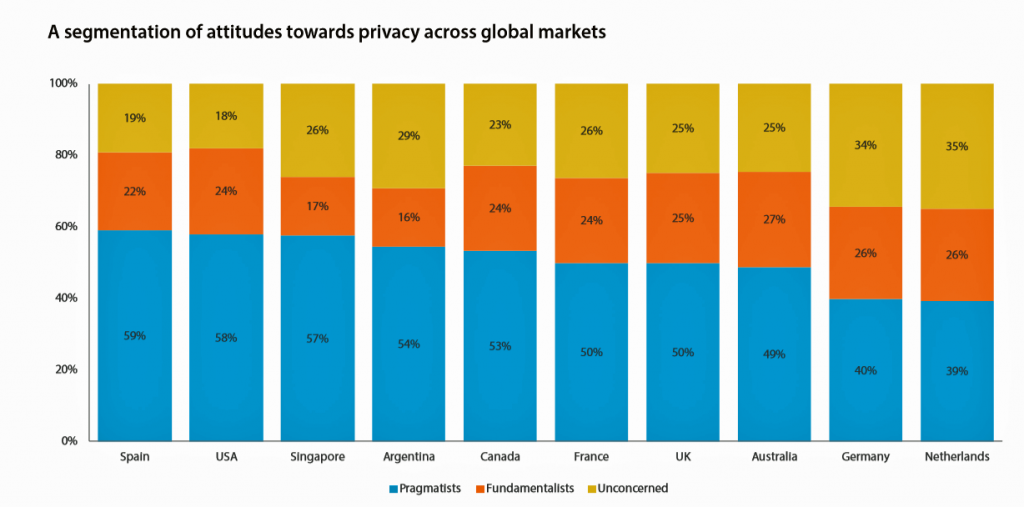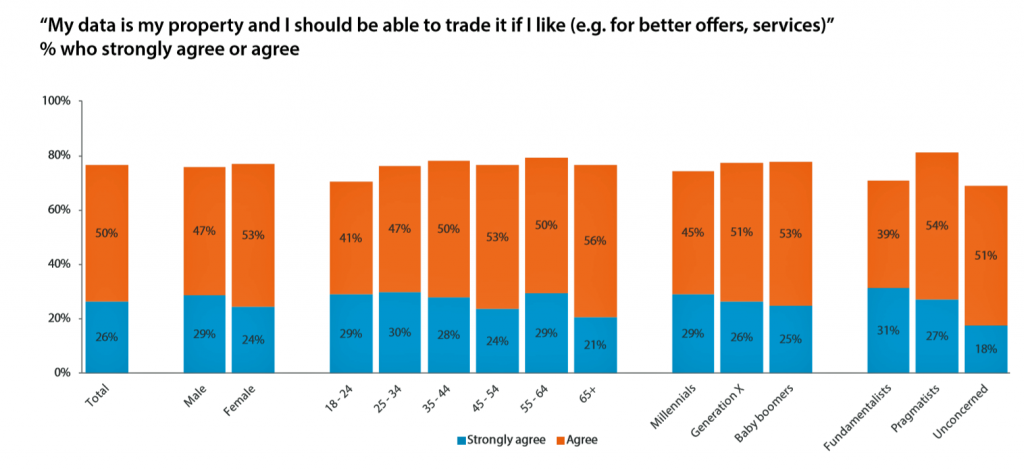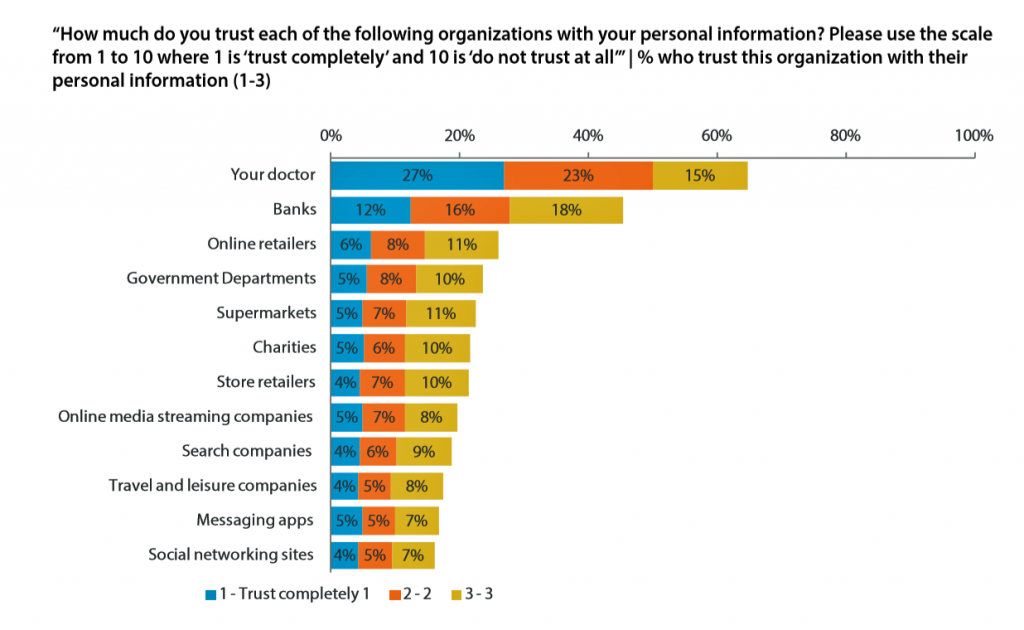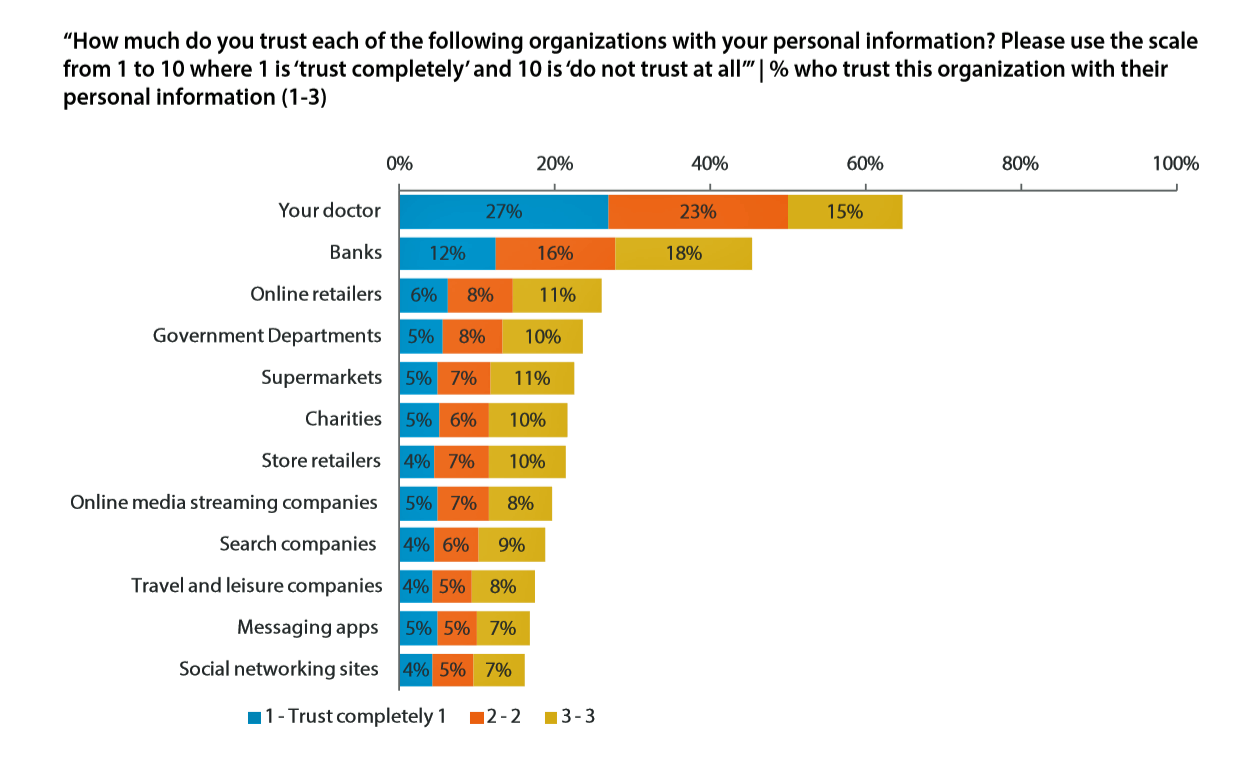In this moment post-Cambridge Analytica/Facebook, the launch of the GDPR, and the everyday-ness of data breaches, consumers most trust doctors for sharing personal information.
I’ve mined, through my health economic lens, the U.S. data published in the insightful report, Data Privacy: What the Consumer Really Thinks, a global research study from Axciom and the Data & Marketing Association (recently acquired by the Association of National Advertisers) working with Foresight Factory.
 The report compares consumers’ personal views on privacy and trust in ten countries: Argentina, Australia, Canada, France, Germany, the Netherlands, Singapore, Spain, the UK, and the US.
The report compares consumers’ personal views on privacy and trust in ten countries: Argentina, Australia, Canada, France, Germany, the Netherlands, Singapore, Spain, the UK, and the US.
We learn that Americans are most like peers in Spain and Singapore, donning the hat of “data pragmatists:” people who are willing to trade-off, on a case-by-case basis, personal information in exchange for services or value deemed worth the sharing.
The other two categories of consumers’ privacy and sharing styles are the Fundamentalists and the Unconcerned: the former group are people who are unwilling to provide any personal information even in exchange for services. Unconcerned’s are folks who don’t worry about data collection and use of their information. The least-concerned citizens live in Germany and the Netherlands. The most private people who least want to share personal data are those in Australia.

In the U.S., 3 in 4 people believe their data is their property, and that they should be able to trade it if they choose to do so – for services, discounts, or other offers. Interestingly, as the second chart shows, this privacy perspective is shared across gender, age cohort, and generation.

The most trusted party/organization for sharing personal information is “your doctor,” noted by 27% of Americans who would “completely trust” their own physician with their personal information. Doctors are followed by banks, totally trusted by 12% of people in the U.S. for sharing personal information.
Other important data points in this study are that:
- 75% of consumers believe business most benefits from personal data exchange in the U.S.
- 84% of people in the U.S. want more control over the personal information they give companies and how it is stored.
- 60% of Americans say that the more personal or private the data they share with a business or organization, the more people expect in return for a value exchange.
- To participate in data sharing with a company, people in the U.S. seek transparency: 84% expect terms and conditions will be easy to read and understand, 83% want a flexible privacy policy allowing them to control the types and amount of data they share, and 84% want clear information about how their data is collected and used.
- The top incentives Americans prefer for sharing their data are direct financial rewards or cash payments, free products and services, followed by loyalty points and discounts on products/services.
Health Populi’s Hot Points: Trust is a precursor to health engagement, and peoples’ personal physicians are seen as the most trusted data steward in the information ecosystem — not just in healthcare, but in consumers’ everyday lives, above banks, retailers, government agencies, grocers, charities, and online companies.
Healthcare is getting connected in the emerging Internet of Healthy Things, within the legacy healthcare system and at home via remote health monitoring, on our bodies via wearable tech, and on the move in our connected cars (see this post in Health Populi for more on the car as the third healthcare space). In each connected health scenario, data (and a lot of it) are generated, moving into each app’s or system’s cloud.
Who better than the physician to be the data steward for peoples’ personal health information? Well, how about the end-user consumer/patient/health citizen as the ultimate self-steward of their own data? Acxiom and the DMA found that data control and autonomy are critical for U.S. consumers, 43% of whom believe that responsibility for data security lies with them. As technologies such as personal data lockers and blockchain for personal health records get commercialized, early adopting health citizens will opt for this kind of control in a “Our Data, Our Selves” modus operandi.





 Thank you FeedSpot for
Thank you FeedSpot for